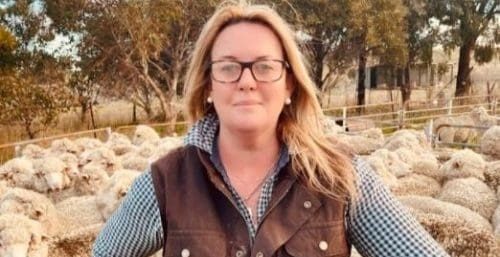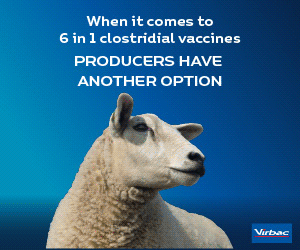
WoolProducers Australia CEO Jo Hall.
A LEAKED live sheep transition plan document is an admission the Albanese Government has effectively killed off the Western Australian wool industry, according to WoolProducers chief executive officer, Jo Hall.
The leaked document marked ‘Confidential’ outlines how the government might spend $45.5 million of a $139.7m transition package to help farmers and other industry people and businesses adjust.
Key parts in the Department of Agriculture, Fisheries and Forestry document recognise the negative impact of the legislated plan to phase out live sheep exports by sea from 1 May 2028.
These include:
$15m for co-development of farm confinement feeding, with producers apply for $150,000 in dollar-for-dollar grants. However, the document also recognises that a key risk and sensitivity is: “insufficient funds to make a strategic difference. Not an option for smaller producers.”
$5m to seed fund initiatives for the industry to navigate challenges, improve market access and attract investment to secure a competitive and resilient future.
The document also recognises the need to provide “immediate support for most affected industries to invigorate local communities.”
 “Supply chain representation at co-design workshops emphasised the impact across several kinds of businesses.”
“Supply chain representation at co-design workshops emphasised the impact across several kinds of businesses.”
It also recognises that shearing and related skills “represent a vital component of the WA wool industry that will experience disruption such as reduced employment opportunities due to the policy.”
It identifies that some WA trucking operations are highly geared to the live sheep trade and will suffer business and capital losses due to the policy.
Industry sector non-matching grants mentioned for business plan development, advice, resilience and development activity, and upskilling include:
For producers consigning an average over three years of more than 1000+ sheep per annum to the live sheep export trade, 350 grants x $40,000 totalling $14,000,000 over three years.
WA shearing contractors, 30 grants x $30,000 over three years totalling $900,000. For business plan development “to upskill for general employment opportunities.”
Trucking and logistic companies, 50 grants x $30,000 over three years totalling $1,500,000.
DAFF document reflects early internal planning
A DAFF spokesperson has said the department is aware of the inadvertent distribution of a draft document “which reflects early internal planning for one component of the phase out of live sheep exports by sea assistance program.”
“A range of options are still in development by the department.
“The document has not been provided to government,” the spokesperson said.
“All program funding decisions will be a matter for the incoming government.”
Document outlines inadequate funding
Ms Hall said apart from the facts that the document was allowed to become public and it outlined completely inadequate funding to apparently assist Western Australian producers and industry, “when you look at the details surrounding the $900,000 earmarked for shearer contractors, they have essentially said that there is no future in in the wool industry.”
“What we found particularly concerning was the $900,000 dedicated to shearing contractors through grants, which according to the document is to upskill staff and become ‘providers of general employment’ given that ‘the sector will experience disruption such as reduced employment opportunities due to the policy’,” she said.
“Of course, this is not news to us as we have said all along that this ill-conceived policy would devastate the WA wool industry, but to see this in black and white in a government document is clearly an admission that they know they are destroying the wool industry in WA.”
Ms Hall said in February, WoolProducers requested that a wool focused co-design transition workshop be convened, where both the independent consultants and department representatives heard firsthand how this decision would impact the wool industry, and how for many current wool industry participants – from growers, shearers, brokers and exporters, simply could not, and did not want to transition to another industry as they had developed specialist wool industry skills.
“I guess you could say that some of those concerns were heard, as there has been money provided for shearers to leave the industry, but there is no support offered for those other affected sectors.
“However, the key message that was not heard, was that people did not want to leave the industry, they wanted to be able to stay in the wool industry and not have poor government policy interrupt their livelihoods,” she said.
“It is beyond ironic when you consider that shearers founded the Australian Labor Party in 1891, but here we are today with a Labor policy forcing shearers out of their own industry.”

Keep the Sheep.
This is the first time I question my vote for this government which obviously made a decision to keep what they perceived as bad publicity for a minority that have food on their table daily produced by farmers for everyone. So sorry?
Where will all the seasonal workers come from for seeding and harvest?